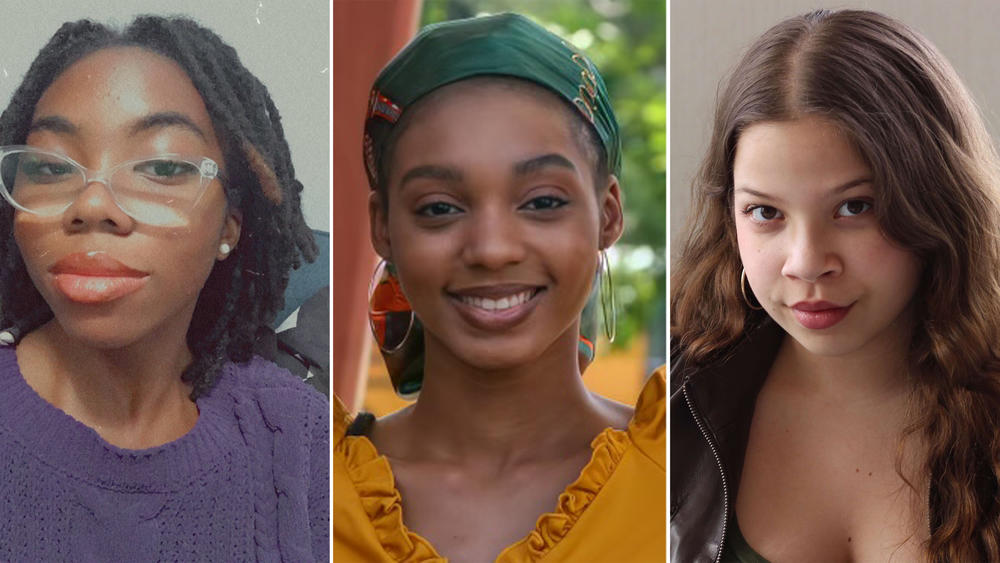Section Branding
Header Content
Young playwrights confront gun violence with their art and say #Enough
Primary Content
Wednesday marks the 23rd anniversary of the Columbine school shootings. Across the country, theaters and civic organizations are commemorating this event by presenting readings of eight short plays by teenagers. The program is called #Enough: Plays to End Gun Violence.
Director Michael Cotey was in rehearsal on February 14, 2018, when the shooting at Marjory Stoneman Douglas High School in Parkland, Fla., occurred. "This was the third time that I had been in rehearsal when one of these horrific mass shootings have happened," says Cotey. "So, Sandy Hook and Las Vegas, specifically. And I was like, there's got to be some way we could respond as a theater community to what felt like this just ... ceaseless violence.
Inspired by student protests following Parkland, he created the #Enough plays. In 2020, seven plays by high school students were presented, mostly on Zoom, by major regional theaters, like the Goodman in Chicago and Berkeley Rep, as well as community organizations and schools, across the country.
"It's difficult to make a community if you're just talking at them with stats and numbers," says Avery Hamill, a high school student from outside Philadelphia. He is on the board of Students Demand Action, a group dedicated to ending gun violence, and his chapter sponsored a Zoom reading in 2020. "#Enough is hitting them in the hearts with these breathtaking pieces of student work."
This year, eight ten-minute plays have been selected for live readings, followed by discussions. "We've got nearly 60 communities across the country that are going to be participating in our nationwide reading on April 20, 2022, in, I think, 26 states this year," says Michael Cotey, adding: "We've got a sort of a flagship reading at Lincoln Center in their atrium space."
Lincoln Center's chief artistic officer Shanta Thake thinks #Enough is a good way to start serious discussions about gun violence. "People are much more prone to participate in larger national dialogues if they've seen an art piece about it, and at that moment," she explains.
The young playwrights involved have written wildly different pieces, from realistic to impressionistic, reflecting their own experiences, including personal losses from gun violence. "Travis, also known as T.J., is my younger brother. He was 16 when he passed," says Taylor Lafayette, an 18-year-old senior at the Mississippi School of the Arts in Benoit, Miss. T.J. was killed in a robbery over a year ago, and part of his sister's healing process has been to write the short play Salted Lemonade. "My play really just features about the things that black mothers go through when raising a child to be a grown man," she says, "and just worrying about them because they know of all the things that happen in the world."
Eighteen-year-old Anya Jiménez lives in Fort Greene, Brooklyn, and attends the Professional Performing Arts School in Manhattan. She says she's been participating in active shooter drills since she was six. "There's this whole idea that our generation is supposed to save the world and we're supposed to be the ones to fix everything that has been left for us," Jiménez says. "But we're also being shot dead in algebra class."
She's written It's Okay, a dreamscape, between a mother and the disembodied voice of what the audience discovers is her dead child. Here's an excerpt:
"Another gun, another shooting. It shouldn't have happened. Thoughts, prayers, thoughts and prayers. Shot and dead. Thoughts and prayers. Shot and dead. Shot and dead. Shot and dead. And again and again and again and again. It shouldn't have happened. And you think about what a body is when it's in your hands and it used to be her. But now it's it. And it's heavy and it doesn't wake up and it shouldn't have happened. But it did. And I'm still here and she doesn't get to be. And it just keeps coming. How long until I wake up?"
McKennzie Boyd has written Southside Summer, about her neighborhood in Chicago. She adapted it from a poem she wrote about gun violence. Even though she's only 16, Boyd seems older.
"We don't want the next generation to have to grow up as fast as we did," she says. "That's all we want. We want that childhood that, you know, wasn't there for us. So now in this authority and adulthood and maturity, we have the ability to do something about this to acknowledge the problem and change things."
She and several of the playwrights will be traveling to New York for the #Enough reading on Wednesday, hoping to be part of that generational change, with their art.
Copyright 2022 NPR. To see more, visit https://www.npr.org.
Correction
An earlier version of the story's photo caption misidentified Taylor Lafayette as Taylor Livingston.

